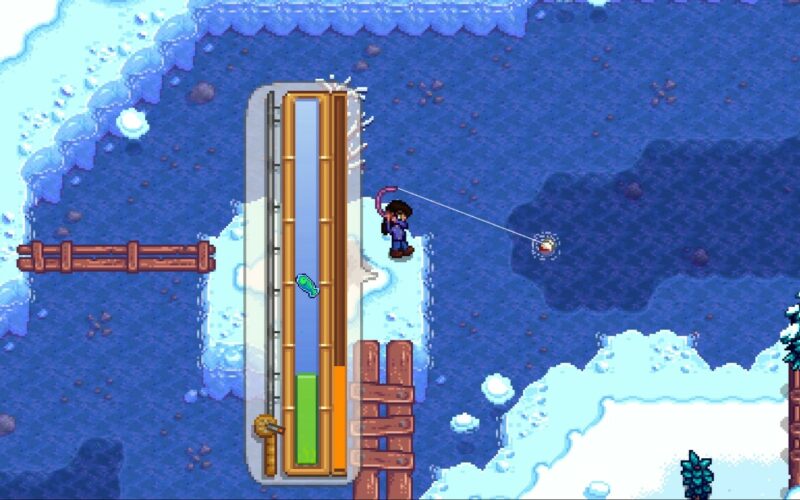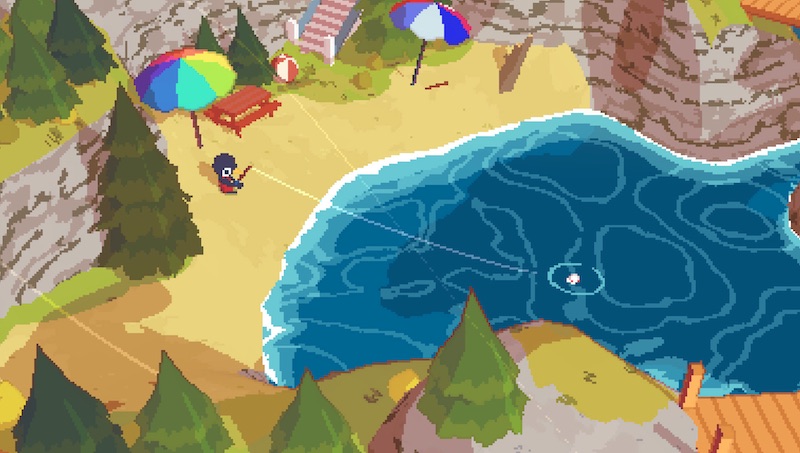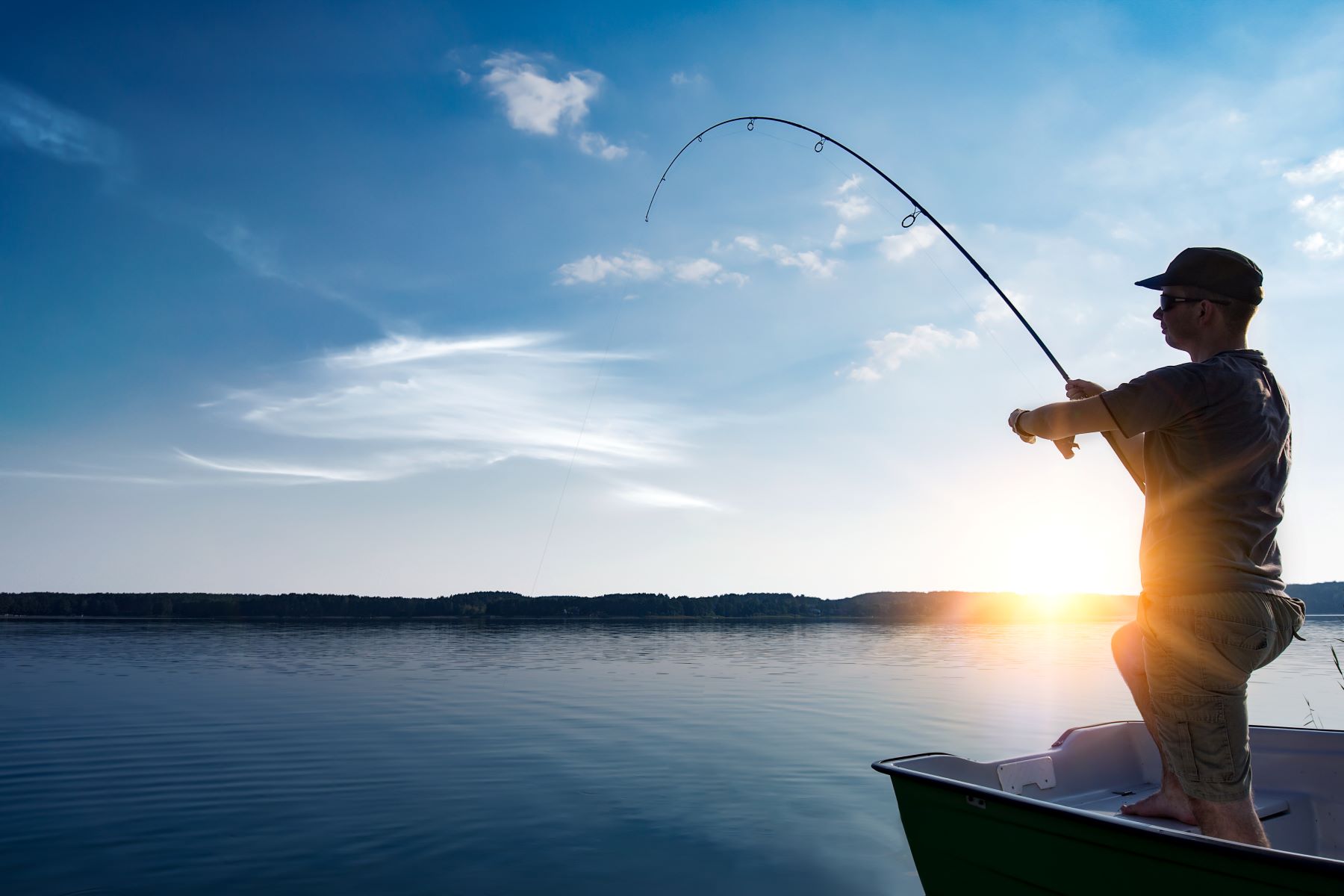Inspiration
During the discussion about biological genres vs. cultural genres, I was thinking about how biological genres are characterized by what a game is: the mechanics, appearance, etc., whereas a cultural genre is more concerned with what a game does or what it stands for. Analogously, dogs and goldfish are very different biologically, but are both commonly kept as house pets. One of the arguments for Hades as the “best” roguelike way back in Week 2 was that it isn’t necessarily the most similar to Rogue, but rather it stretches the possibilities for a game to be considered a roguelike, which is a cultural argument for the roguelike genre.
Separately from these notions of genre, I was also thinking about the prevalence of fishing minigames in the discussion about platypus games and hybrid genres in response to Stardew Valley. I can think of many more games with fishing minigames than games that are primarily focused on the act of fishing. From life simulator games like Animal Crossing or Stardew Valley, to cozy games like A Short Hike, to much larger role-playing games like Final Fantasy XV or Fire Emblem Three Houses, there’s a wide variety of games that contain a fishing minigame in one way or another.

Connecting the Ideas
It seems that the role of fishing in all of these games is to add a small diversion to the overall progression of the narrative, especially in the RPGs. In A Short Hike, fishing is one of the many diversions the player can encounter on the way to the top of the mountain. In Fire Emblem Three Houses, fishing is one of the many things the player can do in the short segments between chapters at the end of each month. Fishing adds to a feeling of the mundane that is either the core of the game, or in contrast to the extraordinary, grand narrative that is currently happening.


Because of this small role that fishing minigames tend to play, I would argue that the presence of a fishing minigame is itself a cultural genre. Or alternatively, they are one of the most common examples of an alternate game mode that adds to a larger sense of normalcy or the ordinary. Fishing minigames themselves are accompanied by certain tropes, such as setting records for the largest fish, or using the fish you get to cook a meal, or selling fishes of varying quality for a monetary reward. Not only that, but there’s also a certain culture surrounding fishing minigames specifically that is appealing to some, as shown below. When playing through Tales of Arise, I was pleasantly surprised by the existence of a fishing minigame that I could play to cook new seafood dishes. Fishing in non-fishing games is a distinct enough occurrence, and is culturally significant enough that it should be considered a genre.
Proof of Cultural Relevance




It’s incredibly difficult to think of another “microgenre” that is as all encompassing as fishing minigames. Every other example i can think of either isn’t as distinct or wide reaching as fishing. I think there are many different reasons as to why this is the case. Minigames must be separate from the main game, relaxing in nature, but still require some amount of skill. Fishing is able to tick those boxes very easily, and still allow for creativity in how it’s controlled. Maybe you’ll catch fish on reaction, like Hades, by pulling towards the player, like in A Short Hike, some combination of the two, or something entirely new!
(It is true that we discussed this in person earlier but I’ll replicate some of the thoughts. Ideas presented here are not fully my own)
I really like your formulation of fishing minigames as a very real cultural genre. However, it’s pretty hard to come up with a game that was created for the “fishing genre” alone — plenty of games contain fishing as one element, but very few games are just about fishing. It’s very interesting that fishing appears in this way. Another cultural micro-genre (to steal the above comment’s language) that one might be able to quantify would be cooking mechanics or minigames, which are definitely less prevalent than fishing games but I think we could stretch it to work. However, there are plenty of games that are about cooking entirely. I’m mostly thinking of Overcooked, but there are other examples as well. What is it about fishing that makes it so omnipresent as a feature of games, but so scarce as the defining feature of games? Are there any other cultural microgenres that have this dynamic as well?
I want to establish before I start that this is all speculation, so I may be entirely wrong. Although maybe not a complete answer to your question, I feel like fishing and hunting games in general seem to be more popular arcade games, rather than games made for consoles. Every time I go to Dave & Busters or a bowling alley/arcade establishment, there are often deer hunting and fishing games placed somewhere on the game floor. To me, these games are just games designed for arcades. Of course, there is Sega Bass Fishing, which is the one exception that I can think of, but this genre of game just is more arcade-based rather than designed for console. And I feel like since arcades are dwindling and are not as popular as they were in the 70s to 90s, it is assumed that these games for arcades are also not popular enough to be played on their own. Of course, there are people that enjoy the real-life equivalent, so I feel this is where they stopped making entire games based on these activities and instead embedded them into narratives and the game itself as a fun side quest or pastime.
When only taking into account the cultural impact, it would seem that there are more games with fishing minigames in them than exclusive fishing games themselves. However, there are actually a surprising amount of fishing games out there,, many of which seem to appeal to the most casual gamer on any home console. This would then explain this phenomenon; as more serious gamers are usually the ones that define the online discourse, playing more intense games that include fishing as a side quest of some sort would lead to a greater discussion than the genre of fishing games themselves. It seems to me that fishing taps into the same universal feeling of relaxation. It serves as a momentary pause in the action, a break in gameplay that the player can choose to make. Fire Emblem Three Houses should be considered a fishing simulator first and foremost with only some aspects of a strategy RPG on the side.
I loved the topic of this blog post. It reminds me of how in “The Last of Us” the protagonist is able to use their break in between missions to play this super realistic guitar or in “Red Dead Redemption” play a good game of poker. These mini-games that are embedded into these overall larger, more intense, progressive storytelling games make the game all the more interesting to play. It begins to simulate real-life even more as mundane activities are put into them in a very subtle way. Sometimes these mini-games serve as a way to participate in the main narrative, or sometimes these mini-games are simply for enjoyment.
Great post!
I loved reading your article. You have me wholeheartedly convinced that fishing is its own culture genre, despite being embedded within a vast array of differing games and genres. That’s pretty neat!
I like to think of fishing minigames as a mechanic of the larger game that’s purpose depends on the genre of the game. For example fishing minigames in RPGs such as Assassins Creed or FFVI serve as a grounding mechanism to bring the character/player back to planet earth during a relatively fantastical or dramatic narrative. Whereas in games such as A Short Hike, it works more naturally as a part of the game just as adventuring or flying is. In mundane/cozy games fishing isn’t a grounding mechanism as much as it is apart of the larger theme of calming activities.
In games that actually focus on fishing it can be the opposite of both grounding and calming, sometimes becoming incredibly stressful because of the difficulty and because there is pressure to complete it as a main objective instead of as an optional activity, so there its purpose becomes a plot mechanic and the momentum of the game itself.
What a great and insightful post Ciaran! I have always been fascinated and delighted by a games inclusion of a fishing game and your contextualization of why they are there has furthered my intellectual curiosity surrounding the phenomenon. I also want to pose a further elaboration that maybe this focus on fishing has to stem from the real world culture of Japan having a fish centric diet. Due to Japan’s limited land size, it is very hard and expensive to cultivate live stock traditionally; therefore, animal protein is more scarce. Thus, the access to the sea Japan has allows the country to base their diet, and therefore an important part of their culture is based around fish. As the most influential country when it comes to video games, this then is permeated and spread throughout the world of games; thus, the popular fishing minigames are born! I am in know way saying this is the only reason for fishing minigames to exist. for there are a plethora of reasons as to why this sport or food source can be gamified. I only want to highlight the interesting connection and relationship real world culture and video games’s culture genres. I believe it can best be classified as fishing games are an example of art imitating life.